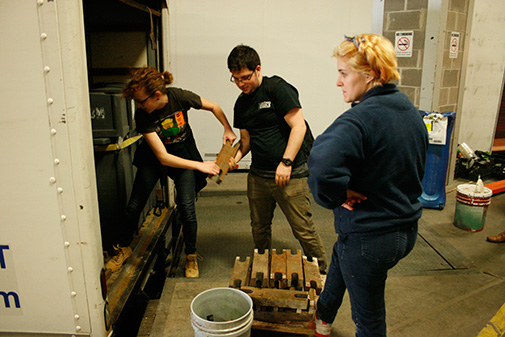News From Mark Shanda, USITT President
Opportunities Are All Around

An extra set of hands can make theatre jobs easier.
For many, August is the start of the production season. In higher education, faculty mourn the loss of last spring’s graduates (now competing for regional theatre jobs or starting graduate school) and anxiously welcome freshmen to campus.
The typical freshman class includes many enthusiastic potential theatre majors still basking in the glow of their senior class play or musical. Each arrives on campus nervous about how to get engaged with a completely foreign group of theatre practitioners. Most fear not fitting in, but some fear pursuing their passion, hearing voices in the back of their heads asking, “You are going to major in what?”
The entertainment industry is both exclusive and inclusive at the same time. A typical show has only one stage manager. Only one Anne Frank can be cast in the production of her diary. Many an Anne want-to-be has been rejected and former outstanding stage managers from high school likely have to wait their turn.
By the same token, productions can almost always find a place for an interested student to work on a build, run crew for a show, work in the box office, or even usher. Production support roles are elastic in the numbers who can get involved.
We used to joke about our standard for backstage participation in a campus production. “Can the student stand erect and fog a mirror? If necessary, we can waive one of those requirements.”
I’m not undervaluing the advantages of a skilled technical labor force to support a production; I’m just emphasizing other two considerations as the production season begins.
Everyone has to start a career in theatre somewhere, so remember to welcome one and all to this marvelous industry. Help them take pride in their work, so that they get hooked on the natural high that our productions bring.
I well remember the pride I felt in showing my parents the plywood bookcase back I had cut out for a production of Edward Albee’s Who’s Afraid of Virginia Woolf? That was my first collegiate theatre technology experience and one that I won’t forget!
Also, don’t forget members of the Institute’s partnership with IATSE, LORT, and CTE educators in developing the Essential Skills for Entertainment Technicians (eSET) program which by its very definition will catalog skill sets to assess individual competency in such areas as rigging, lighting and electrics, costumes, and health and safety.
Watch for details in the coming months as the eSET council works to establish materials for young professionals who will be able to strengthen their resumes by citing their eSET qualifications, and provide employers tools to assess potential employees’ basic skills and knowledge.
There is indeed a place for everyone, but the more skilled we become the better our industry.


We'd like to hear your comments on this story.
Please e-mail Mark at Shanda.1@osu.edu.